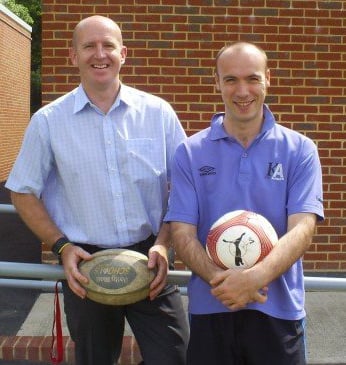Dear Graham, you changed my PE teaching career
Between 2003 and 2013, I worked with Graham Thompson at The Sixth Form College Farnborough in Hampshire. Graham was my HoPE, my line manager as we both progressed up the College and also my friend. Graham – whether he finds it difficult to read or not – changed my PE teaching career and was the biggest external influence on my working life and, therefore, on me and my family. As you will read below, Graham was not just a wonderful manager and leader but also an absolute phenomenon in the classroom. This is the story of Graham’s influence on me and my work. I hope you enjoy it.

Physical education has been taught in different formats and with different ideologies since the late 19th century in the UK but classroom-based or qualification physical education is a relatively modern concept, having first been approved for award as recently as the 1980s. Qualifications such as GCSE PE, A-level PE or BTEC Sport are now common features of schools, sixth forms and colleges, yet the study of how to teach this material in a classroom setting is not even in its infancy. The truth is that PE teachers – despite their almost universal openness to learning and new ideas – are typically not trained in classroom teaching and enter the teaching profession with very little guidance on what is expected of them when they arrive in a classroom.
In my own case, I studied Sport and Exercise Science between 1994 and 1998 and completed my PGCE between 1998 and 1999. Starting my career in 1999, I was teaching classroom-based PE within the first week but I had received little guidance on how to actually do this despite some brilliant efforts from my PGCE Training Manager John. I have occasionally considered that the broadest experience I received during my training in classroom-based teaching was the fact that I was a co-form tutor of a year 9 class and I was expected to take the register twice a day. I believe that we can agree that this is not sufficient.
In other words, I entered the teaching profession as a deeply undercooked classroom teacher. I wasn’t a “good bake” until many years later. I had to learn on the job and I had to do so rapidly because I was teaching GCSE PE from the outset and GCSE PE was rapidly becoming the measuring stick by which the PE department was being judged. I remember thinking “I’m meant to be good at this.” In those early days. I wasn’t willing to acknowledge that I really didn’t know what I was doing. Like many PE teachers, I was capable of holding the attention of a group and communicating effectively with students but the principles that I was applying to my initial GCSE PE lessons were, at best, accidental.
What is perhaps even more startling is that, by the start of my second year of teaching, I was teaching A-level PE to both year 12 and year 13 students. Once again, my behaviours were assumed and I had no firm principles by which I was delivering lessons. Rather, I planned what I could from the limited resources available to me and I stood in front of the class and gave it a go. I would love to be able to enter a time machine and revisit one of those sessions. I wonder to what degree I had an intuition about what good classroom teaching looked like. My sense is that the lessons would be of very poor educational quality and that the James that I am today would have felt quite frustrated with the James of the year 2000 or 2001.
The thing is, classroom teaching, when fully understood, is not too complex. Teachers who apply sound principles to their teaching can expect that their teaching will have a positive learning impact. But how are PE teachers supposed to develop these principles? Is it merely a model of trial and error and a requirement of each PE teacher to reflect on their practice or can the PE teaching sector provide a framework for current and future teachers to learn their trade? I firmly believe in the latter and this is a primary driver of my decision to write this article.
After four years and two different posts in two different schools,I was a relatively experienced teacher of GCSE and A-level PE but this experience did not yet make me a good teacher in the classroom. Rather, I had clocked hours and had gone through the rhythm of teaching, receiving student performance data and then reflecting. Like everyone reading this article, I was driven to improve and to do my work better but, in my case, I had no format to fundamentally challenge the assumptions I was making. My big break came in 2003.
In September 2003, I joined The Sixth Form College Farnborough after being appointed by the Head of PE at the time, Graham Thompson. Those of you with a few years on the clock may recognise Graham’s name: Graham is the author of a wide array of PE textbooks and could commonly be found providing teachers with brilliant CPD and providing revising-students with revision conferences. In other words, Graham was an authority and, for some reason, he saw “talent” in me.
My role was that of PE teacher and my teaching load consisted of the following:
- Three 90-minute lessons of Year 13 A-level PE (1 group)
- Nine 90-minute lessons of Year 12 A-level PE (3 groups)
- Three 90-minute lessons of First XI men’s football coaching
- One 90-minute lesson of First 5 women’s basketball coaching
What's more, my A-level teaching commitments required me to teach the entire A-level qualification. I was teaching A&P, Skill Acquisition, Contemporary Studies, Exercise Physiology, Sport Psychology and Historical Studies. I was well out of my comfort zone and, initially, it showed. My Year 13 students sat a January module exam in January 2004 and, by March, the results came back and were extremely disappointing. There were numerous U grades and all but one student would need to resit. My lack of awareness about how best to teach in the classroom had been exposed and I had no choice but to face the reality of my new job: I either learned how classrooms worked or this new job was not going to last long.
I vividly remember receiving those results. The whole PE department apart from one teacher – Jude, who had recently returned after maternity leave – was in Malta on a multi-sports tour and my Head of Department, Graham, came and sat next to me during a coach trip. He had received a call from Jude back in Farnborough and had received the headlines of the department’s January results. My year 13 group’s outcomes stuck out like a sore thumb. The conversation went something like this:








(Graham taught three year 13 groups at this time.)



As you can tell, Graham was a brilliant and kind Head of PE. He was compassionate and understanding but he also had his own performance standards on the line and he needed me to contribute. In that case, I wasn’t contributing and this experience was the trigger for me to professionalise in my work.
Simultaneously, my family life was changing. In 2005, my elder daughter Anna was born and, like many new parents, my approach to my work saw a gear change. I was now a provider to a partner I loved (still do) and a baby and I began to see my work as the vehicle by which I needed to make my family’s life better. I got my head down and started working and studying.
I read and I thought. I taught and I debated. I experimented and I refined. But the biggest impact of my teaching by far was the simplest: I spent every single free period for a year watching other teachers. I managed to persuade Graham to allow me to sit in his lessons and to simply watch what was happening. I had two blocks of free lessons in my week and, during both, Graham was teaching year 13 groups. I must have watched him teach in the region of 100 lessons. Graham and I agreed that there was to be no formality and no expectations and that I would simply be there, often doing my own admin and planning and that I would experience his teaching. Graham was a magnificent mentor to me. His subject knowledge was, to say the least, outstanding. His relationship with students was exemplary. His fundamental teaching skills were sound. I soaked up everything he did and then, at the right moment, I repackaged it into my own teaching style.
What emerged in 2006 and 2007 was a robust teacher with excellent subject knowledge ready to challenge the ways in which classrooms operated. I had seen Graham – in my opinion, the best teacher to ever deliver in a PE classroom – do it his way and now I wanted to make it mine. I had confidence. I believed in the fundamental process of my teaching and now I had the platform to grow and improve. Once I started, I couldn’t stop.
In 2007, I was appointed Head of PE after Graham was promoted to Director of Faculty. I now needed to guide others and to bring them on. I had a young team with NQTs joining in 2004, 2005 and again in 2006 and I needed to challenge them and move them forward. I consumed every piece of writing that you can imagine about teaching and learning and I experimented with ideas and protocols before introducing them to others in the team.
Specifications came and went, team members left and joined but my belief in what outstanding classroom-based PE teaching looked like was gradually refining to the point where – I believe – I was delivering not only outstanding lessons on a regular basis but I was able to manage outstanding course structures and methodologies. Student results, despite their already positive basis, improved and became some of the best exam performances ever seen in PE theory. My classroom worked and it was based on sound principles, all of which can be applied to any PE classroom.
My impact on the college grew over the following years and, by 2013, I was ready for senior management. After a few failed applications and interviews, I finally got my new role at a local secondary school with a large sixth form. I was to be Head of Sixth Form and Assistant Principal and my ideas and protocols were to be rehomed. It was my understanding of classrooms that got me that job. It was the fact that I could hold my own with any educator in any pedagogical debate that made me stand out from the pack and this, combined with the sector-leading outcomes that were being delivered year on year at the college, landed me the role that I was striving for.
Despite this basis, this new job was not to last long. You see, when you travel this road of reading and pondering, considering and refining, it doesn’t just occupy the standard remit of a teaching role. By 2014, I was publishing regularly online and my resources had become very popular. So much so that by 2015, I had built a PE business that sustained my family, me and a range of employees. This business was to become The EverLearner Ltd and it is now, as CEO of this business that employs about ten people and provides learning to approximately 250,000 PE students, that I write this article.
So, as you can tell, I owe a huge debt of gratitude to Graham. He believed in me but, more than that, he accepted that the path with me would be bumpy and decided to support me no matter what. Graham’s lessons that I watched were, quite literally, brilliant. Forget “outstanding” and whatever that means because it doesn’t come close enough. Graham could teach! You could give him a board pen or a bit of chalk and he could explain what things meant whilst creating a warm and supportive atmosphere that young people loved. I respect him so much. He is the biggest external influence on my career.
N.B. Graham is doing really well. He is the Principal of St Xavier College in West London. I haven’t shared a physical space with him for some time but we message often. I hope that we meet for the beer we keep promising one another very soon. Given what is written above, the first one's on me.
Thanks for reading.
James
%20Text%20(Violet).png)


